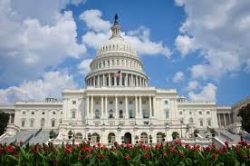A President’s Military Powers: The Last Pillar of Bi-Partisanship?
By Jack Valentine
In the early hours of Friday 26th February, President Joe Biden carried out his first military action as President of the United States in the form of airstrikes in Syria. Aimed at facilities used by Iranian backed militia groups.
Biden’s decision has brought to light many debates surrounding the success or failure of America’s military involvement, alongside the concerns of those who believe this will be a gateway to full-scale military intervention. With particular concern also drawn to how these bombings may impact future negotiations with Iran and nuclear disarmament. Nevertheless, it has highlighted the traditional debate around the Presidents constitutional and political capabilities in relation to foreign policy and military intervention.
Of the many debates surrounding the American Presidency and his (or her) constitutional capabilities, the area of foreign policy seems to be the most widely accepted. By which, I mean it is virtually universally accepted that the President, once in power, can influence foreign policy and use military intervention through virtually any means necessary.
The airstrikes did of course carry elements of controversy from members of congress. Most notably Whip for the Progressive Caucus, a left-wing progressive group within the Democrats, Ilhan Omar highlighted a statement from Jen Psaki, Biden’s Press Secretary which questioned the legality of President Trump's missile strike on Shayrat airbase in 2017. But, the debate in America quickly shifted back to the proposed Coronavirus Relief package. The lack of criticism highlighted the assumption by many members of congress that foreign policy and military intervention fits completely within the remit of the President.
The almost unanimous support from senior Republicans and Democrats has exposed foreign policy and military intervention as perhaps the last remaining pillar of bipartisan support in America.
Bi-partisan support for an American President’s military intervention is nothing new. It is perhaps best exemplified by the Iraq war, whose resolution passed the Senate with the support of 77 Senators. Members of Congress who passionately argue against the powers of a President seemed more than happy to ignore their concerns the moment a President brings in the military. There have been brief attempts to limit the President’s power, most notably the War Powers Resolution of 1973 which was aimed at limiting the Presidents powers to commit America to war without the consent of Congress.
However, these attempts have been stifled through a mixture of Presidents willingly ignoring the legislation in front of them, and political support from a public that typically goes along with their democratically elected President. As we saw with huge public support and ‘rally round the flag’ effect for President George W. Bush’s wars in Iraq and Afghanistan.
Regardless of ones views on American Presidents military interventions, it’s rather unlikely that a Congress bestowed with greater powers in this field would use them in any different way. In fact on some issues congress, or at the very least certain members, have proven themselves to be even more interventionist than the President. As we saw during President Obama’s second-term when senior Senators such as John McCain advocated for full-scale military intervention into Syria.
The question now, becomes whether partisanship will begin to flicker into the realm of military intervention and the Presidents power. Or whether the President of the United States will continue to have almost unlimited power in regard to military intervention?
Perhaps, given the current political discourse in America, it won’t matter at all.
Jack Valentine- 4th Year BA Politics and Parliamentary Studies

